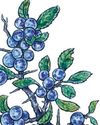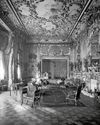
Blenheim Palace, Oxfordshire
The seat of the Duke of Marlborough
TOWARDS the end of the day on August 13, 1704, John Churchill, Duke of Marlborough, exhausted by an intense day of fighting near Blindheim, a village on the Danube, famously scrawled a note to his wife on the back of a tavern bill: 'I have not time to say more but to beg you will give my duty to the Queen and let her know her army has had a glorious victory. The battle of Blenheim-as the name has been anglicised—was, in fact, a confrontation between a Franco-Bavarian army and the forces of a grand alliance of European powers, including the Dutch republic, Austria and Britain, over control of Spain and its empire. It was the first major defeat inflicted on a French army in the field for 50 years and was crowned by the capture of Louis XIV's commander-in-chief, Marshal Talleyrand, who waited in the Duke's coach as he scribbled his hasty message.
News of the victory spread across Europe (the note took eight days to reach England), bringing many rewards for the Duke, joint commander-in-chief of the allied forces. One of the first honours came from Emperor Leopold I, who created him a Prince of the Holy Roman Empire just over two weeks later. The Duke was sufficiently confident to request in return that the dignity should be attached to lands, revenue, and a vote in the Imperial Diet (the following November, he was awarded the Swabian lordship of Mindelheim, which he subsequently visited once in 1713 for four days and described as a place I liked much better then expected but not so as to think of living there'). Rewards also awaited him in Britain at the end of the campaigning year.
Bu hikaye Country Life UK dergisinin May 11, 2022 sayısından alınmıştır.
Start your 7-day Magzter GOLD free trial to access thousands of curated premium stories, and 9,000+ magazines and newspapers.
Already a subscriber ? Giriş Yap
Bu hikaye Country Life UK dergisinin May 11, 2022 sayısından alınmıştır.
Start your 7-day Magzter GOLD free trial to access thousands of curated premium stories, and 9,000+ magazines and newspapers.
Already a subscriber? Giriş Yap

Kitchen garden cook - Apples
'Sweet and crisp, apples are the epitome of autumn flavour'

The original Mr Rochester
Three classic houses in North Yorkshire have come to the market; the owner of one inspired Charlotte Brontë to write Jane Eyre

Get it write
Desks, once akin to instruments of torture for scribes, have become cherished repositories of memories and secrets. Matthew Dennison charts their evolution

'Sloes hath ben my food'
A possible paint for the Picts and a definite culprit in tea fraud, the cheek-suckingly sour sloe's spiritual home is indisputably in gin, says John Wright

Souvenirs of greatness
FOR many years, some large boxes have been stored and forgotten in the dark recesses of the garage. Unpacked last week, the contents turned out to be pots: some, perhaps, nearing a century old—dense terracotta, of interesting provenance.

Plants for plants' sake
The garden at Hergest Croft, Herefordshire The home of Edward Banks The Banks family is synonymous with an extraordinary collection of trees and shrubs, many of which are presents from distinguished friends, garnered over two centuries. Be prepared to be amazed, says Charles Quest-Ritson

Capturing the castle
Seventy years after Christian Dior’s last fashion show in Scotland, the brand returned under creative director Maria Grazia Chiuri for a celebratory event honouring local craftsmanship, the beauty of the land and the Auld Alliance, explains Kim Parker

Nature's own cathedral
Our tallest native tree 'most lovely of all', the stately beech creates a shaded environment that few plants can survive. John Lewis-Stempel ventures into the enchanted woods

All that money could buy
A new book explores the lost riches of London's grand houses. Its author, Steven Brindle, looks at the residences of plutocrats built by the nouveaux riches of the late-Victorian and Edwardian ages

In with the old
Diamonds are meant to sparkle in candlelight, but many now gather dust in jewellery boxes. To wear them today, we may need to reimagine them, as Hetty Lintell discovers with her grandmother's jewellery